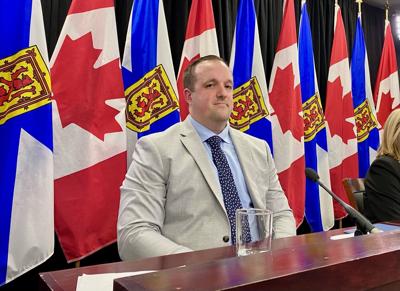HALIFAX - The Nova Scotia government says it's making progress on improving public access to mental-health care, but advocates say the province is falling short.
Nova Scotia Premier Tim Houston promised universal mental-health care in his party's 2021 campaign platform prior to a provincial election that first brought his Progressive Conservatives to power.
Houston's 2021 pledge included a promise to spend an estimated $100 million per year so that registered psychologists, social workers and counselling therapists in Nova Scotia would be able to directly bill the province for patients seeking treatment.
Four years later, the Houston government has still not delivered on that mental-health care pledge, despite winning another election in 2024. But Brian Comer, minister of mental health and addictions, says the government's goal of creating universal access to mental-health care remains unchanged.
"The goal remains the same as it did in 2021, to connect people to care faster, regardless of their ability to pay out of pocket. The delivery of universal access has been shaped based on input from the experts, including clinicians and our partners in health care," the minister said in a statement to The şĂÉ«tv Press.Â
Comer said the province has been making progress based on that feedback, and more people are being connected with mental-health services through the public health system, community organizations and the private sector. A department spokesperson said it has put $136 million more into mental-health and addictions services since 2022, and the office's annual budget for the 2025-26 year is $364 million.Â
But Isaac Wright, a social worker who works with young Nova Scotians navigating the mental-health systems, said the province is nowhere near reaching its 2021 target.
"We are very, very far from hitting universal mental-health care," he said in an interview Monday.Â
Alec Stratford, registrar of the Nova Scotia College of Social Workers, echoed Wright, saying adequate mental-health care remains inaccessible for too many Nova Scotians.Â
"The public system is still grossly underfunded ... Our services are not meeting needs," he said, adding that the province especially needs to boost support to community groups that provide specialized mental-health support for African Nova Scotians, Indigenous and LGBTQ+ people.Â
Stratford also noted that the şĂÉ«tv Mental Health Association calls for governments to spend 12 per cent of their health budget on mental health in order to meet peoples' needs. Nova Scotia is set to spend $5.97 billion in total health funding in the 2025-26 budget – the $364 million budgeted for mental-health care represents six per cent.Â
Comer noted in his statement that the province has created new support for youth and new recovery centres. It has also established a program for people with mood and anxiety disorders that has so far allowed more than 200 patients to book counselling through a private registered professional that is billed to the province.Â
"This is a real collaboration that helps more people access the right level of care at no cost to them. This is universal care," Comer said in a statement.
Dr. Alexa Bagnell, the chief of psychiatry at the IWK children's hospital in Halifax, said in her view, mental-health care for youth has "transformed" over the past five years, as more resources have been made available for young people in their communities "where they're already connected."
This new model, which has been set up in three communities so far with five more coming in the next couple of years, helps young people and families access a range of mental-health support options, she said.
"It's a pretty amazing model … we're trying to create a seamless flow for youth whenever they show up, we should be able to connect them to the right service," Bagnell said.
For Halifax woman Gabriela Nogueira, the government's failure to implement the provincially funded counselling or therapy that it promised feels like a big let down. She said in her experience, many of the public system's options for mental-health care result in someone having to talk about their trauma over and over again.Â
"Always starting over with a new therapist isn’t just unrealistic, it’s harmful ...Therapy only works when the nervous system feels safe, which can't happen when there's constant turnover" in care, she said Tuesday.Â
Wright said he has reservations about the government's reliance on private practitioners, saying the province ought to be bolstering the public system instead. "It would seem like a step towards privatization, which I think could eventually result in cuts to the public mental-health system."
He said the government should increase the availability of counselling and the number of people working in case management "who can help people navigate the community and medical services" on an ongoing basis so patients don't fall through the cracks.
This report by şĂÉ«tvwas first published Nov. 18, 2025.Â















































